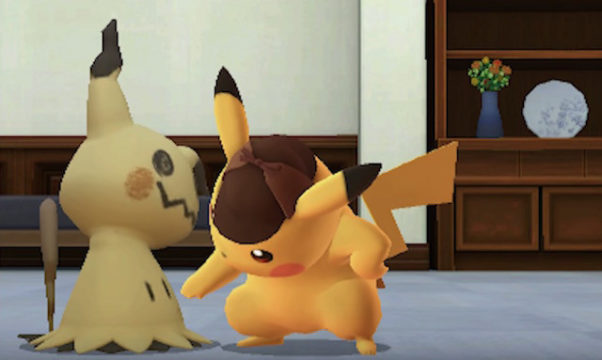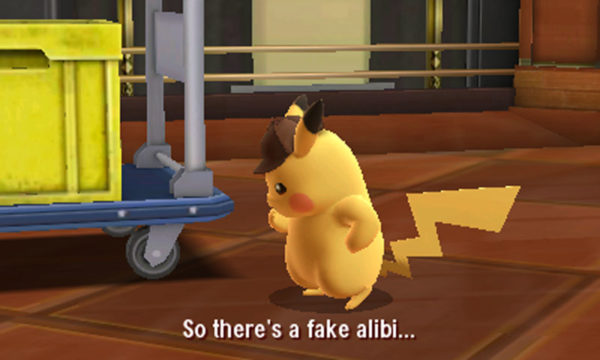Fun and unique take on the Pokémon world; great sense of humor; terrific sound
Having to solve puzzles the exact right way; some monotony; a little too forgiving, at times
In the summer of 1999, Nintendo released Pokémon Snap on Nintendo 64. It was not the first time Pokémon had appeared on the system (Super Smash Bros. released a few months prior), but it was notable in that it depicted a Pokémon world not possible on the original Game Boy. In Snap, fans first got to see Pokémon in a game world living and existing outside the battles of Red and Blue. Several generations and spin-offs later, The Pokémon Company hadn’t released another game that truly built-up the world of the games in such a unique manner, but Detective Pikachu is a rare exception.
In Detective Pikachu, players take on the role of seventeen-year-old Tim Goodman as he solves Pokémon-related mysteries around Ryme City. Tim’s father has gone missing, leaving the boy allied with his father’s rather unique partner: the titular Detective Pikachu! While other humans can’t interpret the amnesiac Pikachu’s words, for some reason, Tim can, and the pair quickly begin to solve a number of mysteries related to the elder Goodman’s disappearance.

Gameplay in Detective Pikachu is very much in the vein of point-and-click titles, albeit with a little more freedom to explore. If you’ve ever played a Phoenix Wright game, you’ll have an idea of what to expect from Detective Pikachu. The title separates different cases into nine chapters, all following the same overarching narrative. Players gather evidence by talking to different humans and Pokémon, then use the clues provided to solve each mystery. While this technique works well, Detective Pikachu also features a familiar failing of the Phoenix Wright franchise: sometimes you might know the answer to a puzzle, but you have to figure out how the developers want you to solve it. That said, the cases themselves have a moderate difficulty level, so there isn’t anything that will likely prove to be too confounding. In fact, the game is almost a little too forgiving at times, as there isn’t any real punishment for choosing the wrong clue when presenting a case, or missing a context sensitive button press.
While the gameplay can get a bit monotonous at times, the strength of the game’s narrative helps keep Detective Pikachu feeling fresh. The title fully embraces the concept of a detective mystery set in the Pokémon world, with enough twists and turns to keep players guessing until the end. There are even a couple of intriguing cameos thrown in for good measure, as well.
The sound in Detective Pikachu is fairly strong, for the most part. The music is catchy and memorable, but the Pokémon themselves sound terrific. Detective Pikachu is the only Pokémon that speaks English in the game (other Pokémon talk to Pikachu who communicates to Tim), and the character is perfectly voiced. It’s amazing how the character can look so familiar, yet take on a completely different and distinctive persona through this game. It would have been nice to get Ryan Reynolds for some movie synchronization, or Danny Devito as some fans wanted, but the voice actor here does a charming job in the role. Like the aforementioned Snap, Detective Pikachu is one of the few Pokémon games where the creatures actually speak their own names, as they do in the anime. While there is a bit of debate in the fan community about which cries Pokémon should use in the games, here, it’s absolutely the right choice, giving so much personality to Ryme City and its Pokémon inhabitants. Though the Pokémon themselves sound terrific, the rest of the voice cast is a bit more of a mixed bag. No one in the game is particularly grating, but no one outside of Pikachu is all that memorable, either.

Perhaps unsurprisingly at this point in the 3DS’ lifespan, Detective Pikachu features no use of 3D. The Pokémon franchise has historically downplayed the feature, but this game eliminates it entirely. The game’s graphics are still strong without it, however. The world looks sharp and the Pokémon character models themselves look terrific. The game does make some use of the system’s touch screen, albeit in small doses. While Nintendo has not announced any plans to bring the title to Switch as of this writing, it certainly wouldn’t be surprising to see the game appear on the system closer to the film’s release.
Detective Pikachu’s western debut is accompanied by one of the biggest Amiibo Nintendo has ever released. Aesthetically speaking, it’s a terrific figure, and one of the best looking Amiibo Nintendo has released to this day. When scanned, the figure allows players to view previously unlocked “Pika Prompts,” short videos where Detective Pikachu gives hints in the game. Players can play them in order, shuffle them and even compile a list of favorites. Like most Amiibo unlocks, it’s nothing pivotal, but the figure is certainly well worth the purchase for collectors.
Playing through Detective Pikachu, it became readily apparent why the title will be the basis for the upcoming live action film: the game offers up a unique take on the Pokémon world, while simultaneously providing something that feels familiar, much like Pokémon Snap once did on Nintendo 64. Some players will get frustrated having to figure out the puzzles in the exact way the game dictates, and they can get a little monotonous at times, but the game’s style and humor will make most Pokémon fans grin from ear-to-ear. Hopefully the live-action film will produce similar results.




 ShareThis
ShareThis





